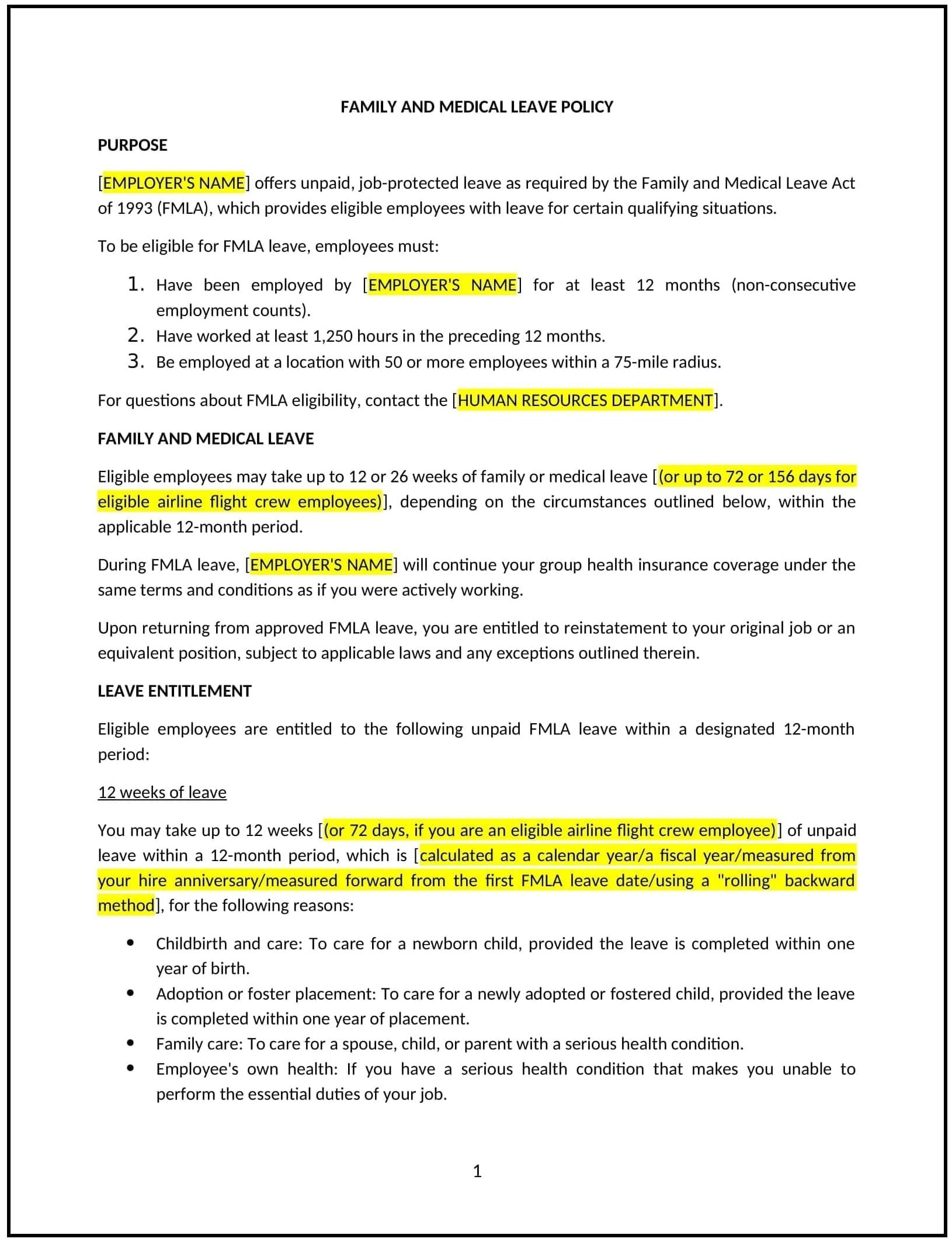Family and medical leave policy (Texas): Free template
Got contracts to review? While you're here for policies, let Cobrief make contract review effortless—start your free review now.

Customize this template for free
Family and medical leave policy (Texas)
This family and medical leave policy is designed to help Texas businesses establish clear guidelines for providing family and medical leave to employees, enhancing compliance with the Family and Medical Leave Act (FMLA) and applicable Texas state laws. Whether businesses are supporting employees during personal or family medical situations, this template provides a structured approach to offering leave while balancing operational needs.
By adopting this policy, businesses can support employee well-being, comply with legal requirements, and foster a positive workplace culture.
How to use this family and medical leave policy (Texas)
- Define eligibility: Specify the eligibility requirements for family and medical leave, including employee tenure and hours worked, to ensure compliance with the Family and Medical Leave Act (FMLA) and Texas state law.
- Outline covered situations: Clearly define the circumstances under which family and medical leave can be taken, such as for personal illness, family care (e.g., caring for a spouse, child, or parent), childbirth, or adoption.
- Set leave duration: Detail the duration of leave employees are entitled to take under the policy, in accordance with FMLA or Texas state law (typically up to 12 weeks of unpaid leave for eligible employees).
- Address paid and unpaid leave: Specify whether family and medical leave is paid or unpaid, and explain how employees can use accrued paid time off (PTO) during their leave.
- Establish notification and documentation requirements: Outline the process for requesting leave, including the notice required from employees (e.g., 30 days’ notice for foreseeable leave) and any documentation required to support the leave request (e.g., medical certification).
- Describe job protection: Ensure employees understand that their job will be protected during their family and medical leave, and they will be reinstated to the same or equivalent position upon return.
- Include benefits continuation: Clarify whether employees will continue to receive health benefits during their leave and the process for maintaining benefits while on leave.
Benefits of using this family and medical leave policy (Texas)
This policy offers several benefits for Texas businesses:
- Supports employee well-being: By offering family and medical leave, businesses support employees during critical life events, helping to maintain their health, productivity, and job satisfaction.
- Improves legal compliance: This policy helps the business comply with the Family and Medical Leave Act (FMLA) and Texas state laws, reducing the risk of legal challenges.
- Reduces turnover: Employees are more likely to stay with a company that offers family and medical leave, improving employee retention and reducing the costs associated with turnover and recruitment.
- Enhances workplace culture: A business that supports its employees through family and medical leave demonstrates a commitment to work-life balance, fostering a positive and supportive workplace environment.
- Improves employee morale: Offering leave for personal and family health issues helps employees feel valued and supported, leading to higher morale and engagement in the workplace.
Tips for using this family and medical leave policy (Texas)
- Communicate the policy clearly: Ensure that all employees are aware of their rights and responsibilities under the family and medical leave policy. Make the policy easily accessible through employee handbooks, the intranet, or HR channels.
- Provide training: Offer training for HR personnel and managers to ensure they understand the policy, the legal requirements of FMLA, and how to handle family and medical leave requests appropriately.
- Track leave usage: Maintain accurate records of family and medical leave taken by employees to ensure compliance with FMLA and Texas state law and to track the leave balance for each eligible employee.
- Maintain open communication: Keep open lines of communication with employees on leave, checking in periodically while respecting their privacy and offering support where appropriate.
- Review regularly: Review and update the policy periodically to ensure it is compliant with changes in Texas state law, federal regulations, or company practices.